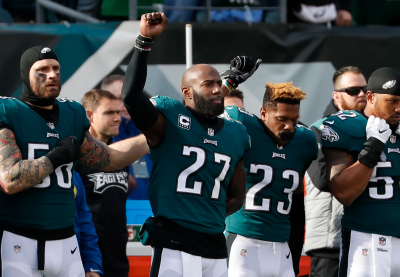I am teaching in a sea of Eagles green these days. The Philadelphia Eagles have won their first-ever Super Bowl, and conversations in the hallways all revolve around the "Philly Special," the dethroning of the GOAT, the number of steps Corey Clement took in the end zone and the parade route down Broad Street. My classes are having a difficult time focusing on Romeo and Juliet, and, honestly, so am I. The only love story we care about is a football story set in the City of Brotherly Love.
I want to remind my students about the "brotherly love" part.
More than any lesson I teach, I want my students to learn the importance of helping others. I want them to feel like they can make a difference through their own actions when faced with biases. I want them to see the possibilities that exist to take action rather than just observing them and allowing the status quo to continue. I want to tap into my students' excitement over the game and generate some conversation about issues that are vastly more important. I want to point through the confetti to some of the men using their influence to draw our attention to social injustices.
Malcolm Jenkins, the Eagles' pick for the Walter Payton NFL Man of the Year Award, is a great player to start with. When he was selected, he explained that he hoped to show people how to "be a part of the solution that they want to see, to be the change that they want to see in the world, to be leaders and thinkers and not be afraid to speak out and not be afraid to stand up for other people."
There is so much to unpack in just that one quote: the need to identify social injustices, the need to think carefully about them and their causes, the need to raise a voice as an advocate. Responding in individual journal entries or discussing as a class the changes they hope to see and the steps they are taking to bring those changes about, students can find a great challenge in Jenkins' ideal.
For years, Jenkins ran a foundation that fed families, facilitated football camps and mentored kids. But it was not until Colin Kaepernick took a knee that he became one of the NFL's most vocal advocates for social change. "It feels like the state of our country and where we are: it's an emergency," Jenkins said in a USA Today interview leading up to the Super Bowl. "There's a need for people with influence and people with access to help get involved."
These are questions that we and our students need to tackle directly: Where do we have influence? What do we have access to that others might not, and how can we help open those doors?
In addition to protesting during the national anthem, Jenkins also wrote about his choice to protest. He has not only drawn attention to the problem; he's aggressively sought opportunities to be an agent of change. He has taken several trips to Harrisburg and to Capitol Hill to talk to lawmakers about ways to address racial inequalities in this country. He has gone on police ride-alongs to better understand the dynamics between police and people of color. He has attended bail bond hearings to learn more about how that process can disadvantage people of color and people experiencing poverty. He has visited with prisoners.
All along that journey, he has worked to learn more about these complex issues. Seeing a problem, he tries to educate himself about it. That is an important lesson for all of our students, especially in a world where news and social media platforms too often reduce complex issues to soundbites.
There are lots of other players making a difference as well. Chris Long donated his entire salary for the year to organizations "whose missions focus on making education accessible to underserved youth." He was the first white player to join the anthem demonstrations when he put his hand on Jenkins' shoulder, making a clear statement that police shootings of black people is an injustice we must all combat.
When a movement began in Philly to push back against the incarceration of Meek Mill for a probation violation, players Torrey Smith, Vinny Curry, Jalen Mills and Wendell Smallwood were all in attendance at a protest. Lane Johnson sold T-shirts and donated the proceeds to Philadelphia schools. When the NFL began selling a similar shirt, he persuaded them to donate their profits to Philly schools as well.
I'm wearing my Eagles Championship T-shirt to school today in honor of the parade. I'll continue to fight through classes with a voice I lost while cheering on Sunday. I'll keep wearing my green sneakers to work.
But I will also keep pressing my students to analyze the ways these athletes use the remarkable influence they have just been given. I will continue to challenge them to look at the issues we face as a nation, to figure out what they can do to help and to act.
Knoll is a rabid Eagles fan and public school teacher living in New Jersey.


0 COMMENTS